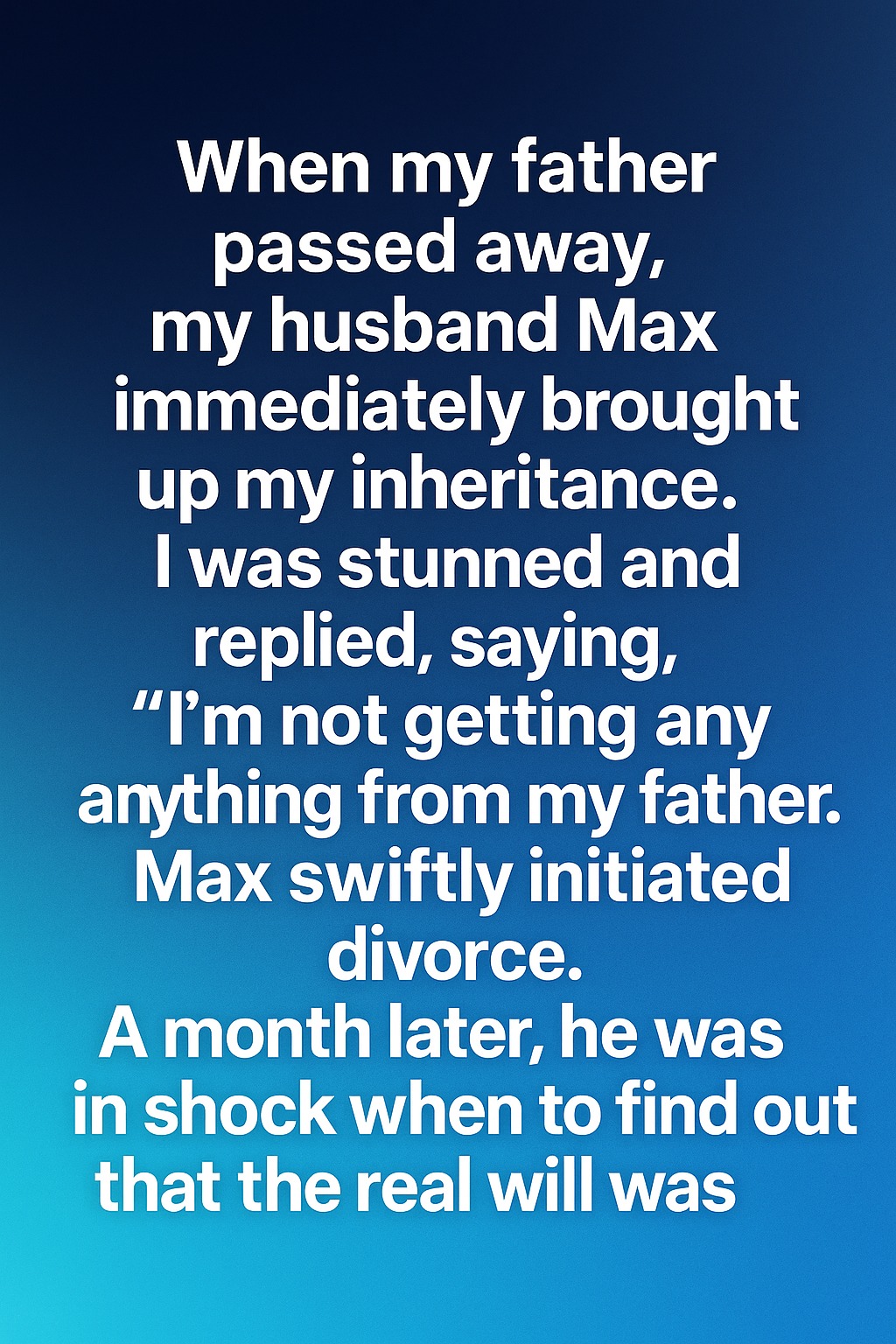When my father died, it felt as if the ground had quietly slipped out from under me. His passing wasn’t sudden or tragic—he left this world peacefully, the way he always lived—but the silence he left behind pressed down on my chest until every breath felt heavy. Grief has a way of hollowing out a home, even when furniture still fills the rooms.
In those fragile days, when the world seemed softer and more tender than usual, Max, my husband, did something that stunned me. Just a few days after the funeral, as I sifted through condolence cards and half-eaten casseroles from neighbors, he asked about the inheritance. No preamble, no gentleness—just, “So, did he leave you anything?”
It hit me wrong. I said honestly, “Dad didn’t have much. I don’t expect anything.” I thought that would be the end, but something in Max’s eyes shifted—something cold, sharp, almost disappointed. He nodded, said nothing else, didn’t hug me, didn’t apologize again. Just silence.
Over the next days, that silence hardened into distance. Max spoke little. He moved through the house as if crossing items off a list, avoided eye contact, and answered questions with clipped words. At first, I told myself grief shows up differently in everyone. I tried patience. I tried understanding. But this wasn’t grief. It was calculation.
Then, without warning, he filed for divorce.
No conversation, no explanation. He left the papers on the kitchen table like a stack of mail. I stared at them, numb and disbelieving, embarrassed that some small part of me still hoped this was a mistake.
“What is this?” I asked, though I already knew.
“It’s better this way,” he said, eyes refusing mine. “We’re not… compatible.”
He couldn’t even offer a lie I could accept.
I wanted to scream, demand answers, call him a coward—but grief had drained me of any fight. I signed the papers with hands steadier than I felt, and when he walked out that last time, he didn’t glance back. I watched him through the window, wondering how long he’d been waiting for the “perfect” moment to leave—a moment when I was already broken.
The following weeks were quiet. I traded a husband’s absence for my father’s memory, which felt kinder. I rebuilt myself slowly, piece by piece—donating clothes, organizing the house, visiting my mother. The ache dulled, becoming something bearable.
Then came a call from my father’s attorney. Gentle, careful, the kind of voice trained to deliver life-altering news without breaking the listener.
“I think it’s time for us to meet,” he said. “Your father left instructions to share the will privately, once everything was finalized.”
“He… had a will?” I asked.
“Yes,” he said. “A very thoughtful one.”
In his office, he handed me a sealed envelope, my name written in Dad’s neat script. Inside was a letter he’d written months before passing. He explained he hadn’t wanted anyone—especially me—pressured while he was alive. The will should be revealed only when everything was orderly, free of influence or manipulation.
He left me his childhood home, the savings he quietly accumulated, and a stack of handwritten journals spanning his life. “Roots,” he called them—the pieces of himself I could hold when the world felt unsteady.
The letter ended with words I’d never forget:
“There is strength in you that you haven’t even met yet. Use this life well, sweetheart. Use it the way I know you can.”
I cried in that office, not for money or property, but because the man who had loved me most found a way to care for me even after he was gone.
Word of the will spread, as small towns do. Max heard eventually.
He appeared at my door two days later, tight-lipped, almost panicked.
“You—you didn’t tell me there was more,” he stammered.
“There was nothing to tell,” I said, calm in a way that surprised us both.
“Maybe we rushed the divorce. Maybe we should reconsider—”
“Max,” I interrupted, “you left a grieving woman thinking there was nothing she could give. Now that there is, suddenly you want to reconsider?”
His face went pale.
“I made a mistake,” he whispered.
“You did,” I said. “And now you get to live with it.”
I closed the door softly. He never knocked again.
That day, I realized what Dad had known long before I did: true love shows itself when everything else is stripped away. Some people love you for what you give; others, for who you are when you have nothing to offer. My father was one of the latter. Max had proved he was the former.
With Dad’s journals beside my bed and a new chapter ahead, I’m learning to walk lighter, to choose people who choose me for the right reasons. I carry my father’s last gift—not a house, not money, but a reminder: real love never asks, “What can you give?” It asks, “How can I stand beside you?”
That, I’ve learned, is the inheritance worth holding onto.
